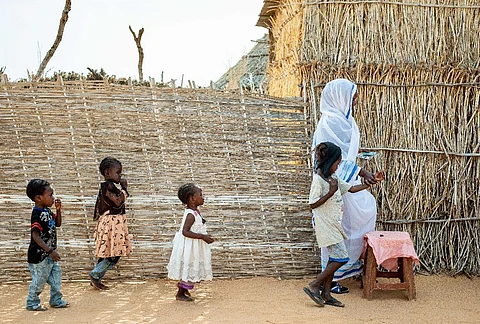

Women-led households in Sudan face triple the risk of severe food insecurity compared with male-headed families, UN Women warns.
75% of female-headed households cannot meet basic food needs; only 1.9% are food secure.
Women-led organisations are providing life-saving food support but are underfunded and excluded from decision-making.
UN Women calls for prioritising aid to female-headed households and integrating women into humanitarian responses.
Women-led households in Sudan are three times more likely to suffer severe food insecurity than those headed by men, the UN has warned, as the country teeters on the brink of famine amid escalating conflict and displacement.
Sudan descended into civil war in April 2023 following a brutal power struggle between the national army and a powerful paramilitary group, the Rapid Support Forces. The conflict has triggered famine and allegations of genocide in the western Darfur region.
According to news broadcaster BBC’s July 4, 2025 report, more than 150,000 people have been killed nationwide in the north-east African country and around 12 million have been displaced.
A new UN Women report, Gender Snapshot: Women, Food Insecurity, and Famine Risk in Sudan, paints a stark picture of the gendered impact of the crisis. It found that 75 per cent of female-headed households are unable to meet their basic food needs, with only 1.9 per cent considered food secure compared with 5.9 per cent of male-headed families. Severe food insecurity among these women-led households has nearly doubled in the past year.
The report also highlights the strain on women’s health, noting that 73 per cent of women nationwide do not meet minimum dietary diversity, putting maternal and child health at risk. Conflict, displacement and entrenched gender inequalities have left many women to support families alone, often after the death or disappearance of male relatives, with limited access to food, income and aid.
With conditions now at near famine thresholds in several regions in the country, it is not just a food crisis, but a gender emergency caused by a failure of gender-responsive action. Women and girls are bearing the brunt of severe food insecurity, with fewer resources, less access to aid, and greater exposure to risk
Salvator Nkurunziza, UN Women’s representative in Sudan
The child rights organisation UNICEF warned on August 3, 2025 that cholera is spreading rapidly through North Darfur, one of the regions hardest hit by the conflict. Over 1,180 cholera cases – including an estimated 300 among children – and at least 20 deaths have been reported in the town of Tawila. The situation across the wider Darfur region is even more concerning, with nearly 2,140 cases and at least 80 fatalities recorded as of July 30.
Despite their vulnerability, women-led organisations are playing a critical role in responding to the crisis, stated a press note from UN Women. Across Sudan, these groups are running food kitchens, delivering meals and supporting displaced families, often with little or no funding. One organisation operating in eight states has been forced to close more than half its kitchens due to resource shortages.
“Women are not only victims of conflict; they are also powerful agents of change,” Nkurunziza said. “Women-led organisations are reaching last-mile communities and saving lives, yet remain underfunded and excluded from key decision-making.”
UN Women urged humanitarian actors and donors to prioritise female-headed households, as well as pregnant and breastfeeding women and adolescent girls, in food assistance programmes. It has called for direct and predictable funding for women-led initiatives, their integration into humanitarian decision-making and for food assistance to be linked to protection and livelihood support, including measures to mitigate gender-based violence.
The agency has also reiterated its call for an immediate cessation of hostilities in Sudan and for warring parties to engage in inclusive peace talks to restore stability and uphold human rights.